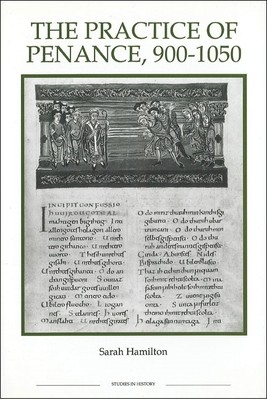
- We will send in 10–14 business days.
- Author: Sarah Hamilton
- Publisher: Royal Historical Society
- ISBN-10: 0861932501
- ISBN-13: 9780861932504
- Format: 16.4 x 24.2 x 2.4 cm, kieti viršeliai
- Language: English
- SAVE -10% with code: EXTRA
Reviews
Description
Penitential practice in the Holy Roman Empire 900-1050, examined through records in church law, the liturgy, monastic and other sources.
This study examines all forms of penitential practice in the Holy Roman Empire under the Ottonian and Salian Reich, c.900 - c.1050. This crucial period in the history of penance, falling between the Carolingians' codification of public and private penance, and the promotion of the practice of confession in the thirteenth century, has largely been ignored by historians.Tracing the varieties of penitential practice recorded in church law, the liturgy, monastic practice, narrative and documentary sources, Dr Hamilton's book argues that many of the changes previously attributed to the twelfth and thirteenth centuries can be found earlier in the tenth and early eleventh centuries. Whilst acknowledging that there was a degree of continuity from the Carolingian period, she asserts that the period should be seen as having its own dynamic. Investigating the sources for penitential practice by genre, sheacknowledges the prescriptive bias of many of them and points ways around the problem in order to establish the reality of practice in this area at this time. This book thus studies the Church in action in the tenth and eleventh centuries, the reality of relations between churchmen, and between churchmen and the laity, as well as the nature of clerical aspirations. It examines the legacy left by the Carolingian reformers and contributes to our understanding of pre-Gregorian mentalities in the period before the late eleventh-century reforms. SARAH HAMILTON teaches in the Department of History, University of Exeter.
EXTRA 10 % discount with code: EXTRA
The promotion ends in 21d.11:12:24
The discount code is valid when purchasing from 10 €. Discounts do not stack.
- Author: Sarah Hamilton
- Publisher: Royal Historical Society
- ISBN-10: 0861932501
- ISBN-13: 9780861932504
- Format: 16.4 x 24.2 x 2.4 cm, kieti viršeliai
- Language: English English
Penitential practice in the Holy Roman Empire 900-1050, examined through records in church law, the liturgy, monastic and other sources.
This study examines all forms of penitential practice in the Holy Roman Empire under the Ottonian and Salian Reich, c.900 - c.1050. This crucial period in the history of penance, falling between the Carolingians' codification of public and private penance, and the promotion of the practice of confession in the thirteenth century, has largely been ignored by historians.Tracing the varieties of penitential practice recorded in church law, the liturgy, monastic practice, narrative and documentary sources, Dr Hamilton's book argues that many of the changes previously attributed to the twelfth and thirteenth centuries can be found earlier in the tenth and early eleventh centuries. Whilst acknowledging that there was a degree of continuity from the Carolingian period, she asserts that the period should be seen as having its own dynamic. Investigating the sources for penitential practice by genre, sheacknowledges the prescriptive bias of many of them and points ways around the problem in order to establish the reality of practice in this area at this time. This book thus studies the Church in action in the tenth and eleventh centuries, the reality of relations between churchmen, and between churchmen and the laity, as well as the nature of clerical aspirations. It examines the legacy left by the Carolingian reformers and contributes to our understanding of pre-Gregorian mentalities in the period before the late eleventh-century reforms. SARAH HAMILTON teaches in the Department of History, University of Exeter.


Reviews